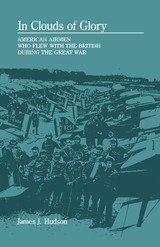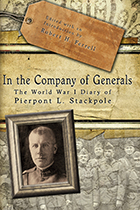4 start with I start with I


Pierpont Stackpole was a Boston lawyer who in January 1918 became aide to Lieutenant General Hunter Liggett, soon to be commander of the first American corps in France. Stackpole’s diary, published here for the first time, is a major eyewitness account of the American Expeditionary Forces’ experience on the Western Front, offering an insider’s view into the workings of Liggett’s commands, his day-to-day business, and how he orchestrated his commands in trying and confusing situations.
Hunter Liggett did not fit John J. Pershing’s concept of the trim and energetic officer, but Pershing entrusted to him a corps and then an army command. Liggett assumed leadership of the U.S. First Army in mid-October of 1918, and after reorganizing, reinforcing, and resting, the battle-weary troops broke through the German lines in a fourth attack at the Meuse-Argonne—accomplishing what Pershing had failed to do in three previous attempts. The victory paved the way to armistice on November 11.
Liggett has long been a shadowy figure in the development of the American high command. He was “Old Army,” a veteran of Indian wars who nevertheless kept abreast of changes in warfare and more than other American officers was ready for the novelties of 1914–1918. Because few of his papers have survived, the diary of his aide—who rode in the general’s staff car as Liggett unburdened himself about fellow generals and their sometimes abysmal tactical notions—provides especially valuable insights into command within the AEF.
Stackpole’s diary also sheds light on other figures of the war, presenting a different view of the controversial Major General Clarence Edwards than has recently been recorded and relating the general staff’s attitudes about the flamboyant aviation figure Billy Mitchell. General Liggett built the American army in France, and the best measure of his achievement is this diary of his aide. That record stands here as a fascinating and authentic look at the Great War.

For more than a century, in settings where the political branches of government were unable or unwilling to exercise self-restraint, the Supreme Court was disposed to treat federal war powers legislation as exempt from judicial review, an attitude that permitted numerous abuses from Prohibition to press censorship.
Though the First World War officially ended in 1918, the Senate’s rejection of the Versailles Treaty kept the United States in a legal state of war until late 1921. Exploring the interplay between political and social events and the evolution of legal theory Christopher May tells how during this challenging three-year period, the government invoked the war powers to pursue ends otherwise beyond its reach: with the backing of Congress and seemingly free from judicial scrutiny, the Wilson administration took over the country’s rail and communications systems, outlawed profiteering, prosecuted strikers, suppressed “radicals” and censored the leftist press. None of these measures bore any true relation to the war, says the author, who then describes the course through which the Supreme Court, confronted by this pattern of abuse, finally abandoned its long-standing refusal to review the constitutionality of war powers legislation.
In the Name of War explores the roles played by Woodrow Wilson, Joseph Tumulty, Albert Burleson, and A. Mitchell Palmer—men whose personal ambitions frequently shaped official policy in the late Progressive Era. After analyzing the Court’s more recent record, including the internment of Japanese-Americans in World War II, May draws some practical conclusions about the use of judicial intervention in time of crisis that are sure to attract the attention of lawyers, legal scholars, historians, and students of the Constitution.

A groundbreaking reassessment of W. H. Auden’s early life and poetry, shedding new light on his artistic development as well as on his shifting beliefs about political belonging in interwar England.
From his first poems in 1922 to the publication of his landmark collection On This Island in the mid-1930s, W. H. Auden wrestled with the meaning of Englishness. His early works are prized for their psychological depth, yet Nicholas Jenkins argues that they are political poems as well, illuminating Auden’s intuitions about a key aspect of modern experience: national identity. Two historical forces, in particular, haunted the poet: the catastrophe of World War I and the subsequent “rediscovery” of England’s rural landscapes by artists and intellectuals.
The Island presents a new picture of Auden, the poet and the man, as he explored a genteel, lyrical form of nationalism during these years. His poems reflect on a world in ruins, while cultivating visions of England as a beautiful—if morally compromised—haven. They also reflect aspects of Auden’s personal search for belonging—from his complex relationship with his father, to his quest for literary mentors, to his negotiation of the codes that structured gay life. Yet as Europe veered toward a second immolation, Auden began to realize that poetic myths centered on English identity held little potential. He left the country in 1936 for what became an almost lifelong expatriation, convinced that his role as the voice of Englishness had become an empty one.
Reexamining one of the twentieth century’s most moving and controversial poets, The Island is a fresh account of his early works and a striking parable about the politics of modernism. Auden’s preoccupations with the vicissitudes of war, the trials of love, and the problems of identity are of their time. Yet they still resonate profoundly today.
READERS
Browse our collection.
PUBLISHERS
See BiblioVault's publisher services.
STUDENT SERVICES
Files for college accessibility offices.
UChicago Accessibility Resources
home | accessibility | search | about | contact us
BiblioVault ® 2001 - 2024
The University of Chicago Press









